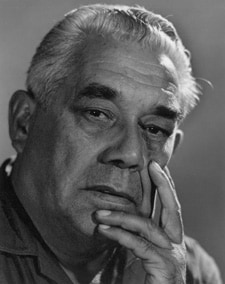
- Inducted:
- 2012
William 'Bill' Onus was a high profile activist and successful entrepreneur. He campaigned to obtain civil liberties for Aboriginal people and mentored a new generation of leaders who were able to build upon his legacy in Aboriginal rights.
Born in 1906 at the Cummeragunja Reserve in New South Wales, Bill was the eldest child of William and Maud Onus, both of the Yorta Yorta people. He had a brother and a sister, and attended school until he was 12 years old, first at Cummeragunja and then in Echuca.
Bill's father was a drover and for a number of years the family travelled together around the Riverina agricultural region. Bill worked as a shearer for seven years after he turned 16. In 1928, he married his first wife, Bella Patten, with whom he had two daughters.
In 1929, Bill moved to Sydney. After a period spent in an unemployed workers camp, he found a job as a rigger and, later, as a driver of delivery trucks. He was an active trade unionist and developed considerable skills as a public speaker.
Bill became directly involved in Aboriginal activism when he joined the Aborigines Progressive Association (APA) in 1939. The Association campaigned for full citizenship rights and parliamentary representation for Aboriginal Australians, as well as the abolition of the New South Wales Aborigines' Protection Board. Bill progressed quickly to the role of Secretary.
As a member of the Committee for Aboriginal Citizen Rights, Bill lobbied for an Aboriginal voice on the Aborigines Welfare Board of New South Wales and ran a successful campaign to elect APA founder William Ferguson when the reform was achieved. He organised regular fundraising events in support of the Aboriginal community of Redfern and established an all-Aboriginal rugby league club in 1945.
Having relocated to Melbourne in 1946, Bill worked as a shipping clerk for a time. He was reunited with former Cummeragunja residents, including his younger brother Eric and Pastor Doug Nicholls. The three reformed the Australian Aborigines' League, which had been dormant since the death of its principal founder, William Cooper. Bill was elected as President. In 1947, he married Mary McLintock Kelly, who was also politically active. They had one son.
Bill came to be a prolific spokesman for the Aboriginal community and worked hard to push Aboriginal issues onto the mainstream political agenda. He was able to express in words the pain and pride of his people, in a way that resonated with non-Aboriginal people. Bill regularly addressed public rallies and appeared in the media. He was one of a committed group of Aboriginal and non-Aboriginal people who believed that a better future was possible. They later formalised their work with the formation of the Aborigines Advancement League in 1957, into which the existing Australian Aborigines' League was subsumed.
The disappointment of several unsuccessful campaigns – including one opposing the construction of the Woomera rocket-testing range on traditional land in South Australia – led Bill to step back from politics for much of the 1950s and early 1960s. However he continued to comment publically, on occasion, on issues such as the unequal pay received by Aboriginal workers.
In 1951, Bill helped produce a hugely successful performance at the Princess Theatre, billed as Out of the Dark: an Aboriginal Moomba. The Australian Aborigines' League had successfully lobbied to have Indigenous people represented in the Golden Jubilee of Federation celebrations that year. In 1954, Bill proposed the name 'Moomba' for the Melbourne City Council's new autumn carnival. The Moomba Festival remains an important annual event in the city.
In what was, for its time, a rather radical example of economic self-determination by an Aboriginal man, Bill established and ran a successful commercial operation called Aboriginal Enterprises from 1952. Using his talent as a craftsman, he produced and sold decorative replicas of traditional implements such as boomerangs and woomeras, as well as Aboriginal-themed souvenirs and greeting cards. His shop and factory in the Dandenong Ranges became a major tourist attraction, with Bill's boomerang throwing demonstrations a drawcard in themselves.
For Bill, the business was more about promoting and preserving the traditions of his people, than it was about profit. He particularly enjoyed working with children and effected several programmes to introduce children to Aboriginal culture. He travelled the country to promote the venture, which operated until 1968, and opened shops in Port Augusta and Narbethong. It was in his workshop that his son, Lin, first learnt to paint, before going on to become an acclaimed artist.
Bill turned his hand to acting and had roles in several Australian films. He narrated a series of documentary shorts, and appeared in a 1967 documentary, Forgotten People, about Aboriginal communities in the Goulburn and Murray Valleys.
In 1967, Bill became the first Aboriginal president of the Aborigines Advancement League, as well as its representative on the Victorian Aborigines Welfare Board. He was the Victorian director of the Aboriginal referendum movement and helped campaign during the 1967 referendum. Bill was also the first Aboriginal Justice of the Peace.
Bill passed away in 1968, having suffered a coronary occlusion. However, he had already inspired a new generation, including his son, to assume the mantle of leadership, and continue the fight for equality and recognition. In the years to come, much would be achieved in his memory.
Updated

